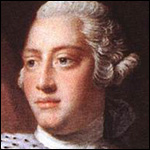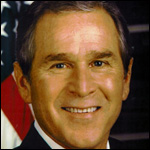
| 
|
He ran up the national debt far beyond the country’s ability to pay, spending millions on occupation of faraway lands (the American colonies in particular), on entangling wars (against France and Spain), and in government subsidies to major corporations (especially the East India Company). | H e ran up the national debt far beyond the country’s ability to pay, spending billions on occupation of faraway lands (Iraq and Afghanistan in particular), on entangling wars (against Iraqi insurgents and the Taliban), and in government tax breaks and overpayments for services to major corporations (especially Enron and Halliburton). |
He turned over administration of a vast Asian country to a private company. (India was overseen almost exclusively by the corporate officers of the East India Company.) | He turned over logistics support and some administration of a vast military operation to private companies. (Halliburton and Kellogg, Brown & Root are the major operators of US military bases and outposts around the globe.) |
| He was roundly criticized by political opponents for attempting to expand the authority of the monarchy well beyond its traditional role. | He was roundly criticized by political opponents — and members of his own party — for attempting to expand the authority of the presidency well beyond its constitutional role. |
| He donated thousands of books to the public, to start a national library. | He instituted (then failed to fully fund) an expensive, overarching, nationwide education-reform plan, which has yet to show any positive results. |
| He was a serious student of science, including having his own astronomical observatory. | He often rejected scientific arguments in favor of religious or ideological beliefs, even as he increased funding to the National Science Foundation. |
He was very interested in agriculture, and was called “Farmer George” for the time he spent on his royal estates. | H e did a lot of brush clearing on his ranch in Crawford, Texas, during his “vacations” and “working holidays” there. |
| He took a strong interest in government-policy debates, and had a sometimes-heavy hand in their outcomes. | His orders and those of his deputies were often invoked to “edit” scientific reports issued by government agencies, to remove information that would support ideologies other than those held by the White House. |
He was blamed for things, like the Stamp Act of 1765 and the Townshend duties of 1767, that Parliament supported, undertook, and enforced, even though they were not always his ideas. | He was blamed for things, like the US refusal to join the Kyoto Protocol, that Congress supported and undertook on its own. |
| He paid for the founding of the Royal Academy of Arts. | His budgets, even after cutbacks in Congress, have increased funding for the National Endowment for the Arts. |
| He did not learn to read until age 11. | He bragged about being a C student while at Yale University. |
He imprisoned political opponents andfree-speech advocates. | His administration imprisoned American citizens without trial and investigated journalists for discovering inconvenient truths about his government. |
| His administration redefined the laws of treason to better control political opponents. | H is administration redefined the laws of national security, freedom of information, and terrorism, and then used them to spy on and manipulate political opponents. |
He was eventually deemed mentally unfit to rule, by reason of insanity. | Nothing official yet. |